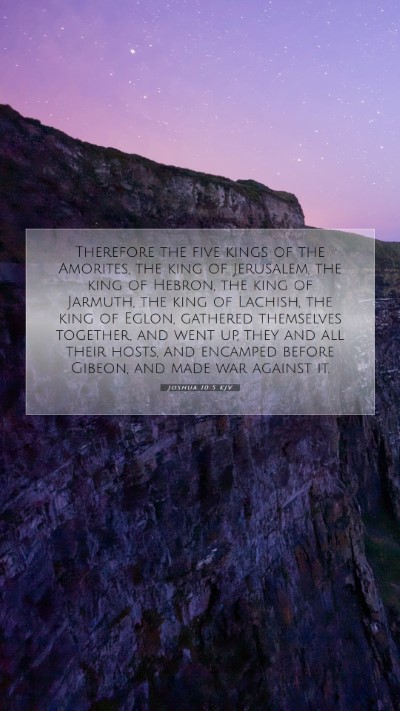Bible Verse Commentary on Joshua 10:5
The verse Joshua 10:5 states, "Therefore the five kings of the Amorites, the king of Jerusalem, the king of Hebron, the king of Jarmuth, the king of Lachish, and the king of Eglon gathered together and went up; they and all their armies, and encamped before Gibeon and made war against it."
Summary of the Verse
In this passage, we witness a coalition of five Amorite kings coordinating an assault against Gibeon, a city that had allied itself with the Israelites. This coalition reflects not just a regional power struggle but also the intense opposition that the Israelites faced as they entered the Promised Land.
Insights from Commentaries
- Matthew Henry's Commentary:
Matthew Henry notes that the gathering of the kings signifies a united front against God's people, demonstrating the seriousness of their opposition. The Israelite victories thus far had alarmed the surrounding nations, leading them to conspire to protect their own territories. Henry emphasizes the importance of divine intervention in battles, hinting at the supernatural support God provides to His people in times of trouble.
- Albert Barnes' Commentary:
Albert Barnes elaborates on the significance of Gibeon's alliance with Israel, mentioning how it was a strategic move for the Gibeonites to seek protection. He points out that the coalition’s aggression serves as a reminder of the consequences of making covenantal agreements, emphasizing that alliances can provoke powerful adversaries in the biblical narrative. Barnes also remarks on the names of the cities, linking their historical significance to the greater narrative of Israel’s conquests.
- Adam Clarke's Commentary:
Adam Clarke provides a detailed analysis of the geographical and historical context of the kings involved. He interprets their gathering as a desperate measure, acknowledging the powerful God who fights for Israel. Clarke also highlights the notion of God's sovereignty in battle, reflecting on how these historical conflicts illustrate the larger theme of God's ultimate authority over nations and their rulers.
Understanding the Context
To fully grasp the meaning of Joshua 10:5, it’s essential to consider the broader context of the book of Joshua. This narrative encapsulates the Israelites’ military campaigns to claim the Promised Land. The fierce resistance they encounter represents a struggle not just for land but for the fulfillment of divine promises made to the ancestors of Israel.
Theological Implications
This verse and the events surrounding it delve into themes of faith, conflict, and divine providence. It provides a concrete example of how God honors the commitments of those who align themselves with Him, even as it invites reflection on the nature of judgment against those who oppose Him. In the New Testament light, this could also be viewed as a foreshadowing of the ultimate triumph of God’s love and justice.
Practical Applications
From Joshua 10:5, believers can understand the significance of alliances and the importance of standing firm in faith against opposition. The passage prompts reflection on how to navigate personal conflicts, encouraging reliance on God for guidance and strength in adversity. Additionally, it reminds us to examine our own relationships and commitments against the backdrop of divine principles.
Cross References
- Joshua 9:15 - The alliance of Gibeon with Israel.
- Deuteronomy 20:1-4 - Instructions for warfare.
- Exodus 23:22 - God's promise of victory for His people.
- 1 Samuel 17:47 - The battle is the Lord's.
- Hebrews 11:30 - Faith of the Israelites in conquering Jericho.
Conclusion
Joshua 10:5 serves as a profound reminder of the reality of spiritual warfare and the assurance of God's support in facing life’s battles. By understanding the complex dynamics at play—the alliances formed, the strategies of nations, and the faith of Israel—readers can gain deeper insights into biblical texts and their applications to modern life. This analysis enhances one’s ability to interpret Scripture, drawing out lessons that resonate throughout the ages.


